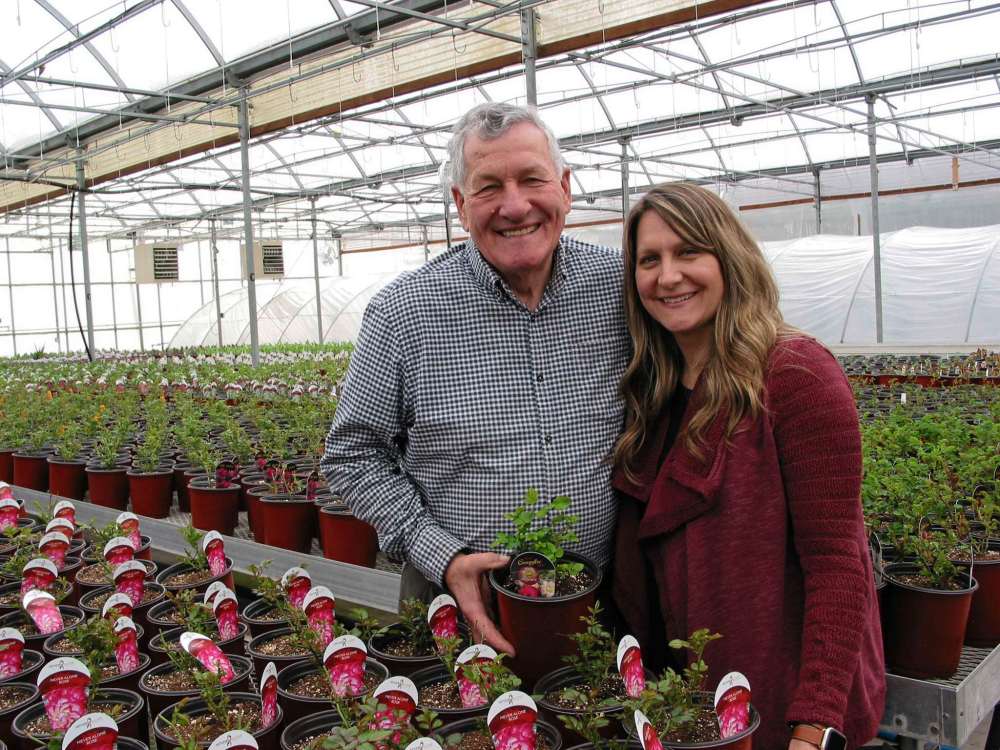Growing prairie-hardy plants
Jeffries Nurseries develops disease resistance in trees
Advertisement
Hey there, time traveller!
This article was published 09/03/2020 (2133 days ago), so information in it may no longer be current.
Snow covers the ground outside the greenhouses at Jeffries Nurseries, but inside seedlings show bursts of green.
On March 4, staff were busy gradually warming up more greenhouse space, mixing potting material and preparing nursery stock for planting, including some plants that were overwintered in cold storage at Jeffries Nurseries and others that were imported.
It was also company president Wilbert Ronald’s birthday. Ronald, a trained horticulturalist, runs the business with his wife Sharon, their daughter Shawna Bell, and sons Andrew and Philip. They produce a full line of nursery stock for garden centres, landscapers and urban tree requirements.

Ronald was working as a research scientist at Agriculture Canada’s Morden Research and Development Centre when he was approached by Jeffries Nurseries owner Ernie Jeffries in 1981. Due to health concerns, Jeffries was looking to sell the business he’d established in 1978 located next to the Trans-Canada Highway about 10 kilometres east of Portage la Prairie.
Ronald said he uprooted his young family to move to the Portage area in 1982 after buying the business.
“We decided to keep the name because it was well-known.”
He said the business grew slowly, but after 38 years, is now the leading Canadian company in nursery crops and noted leaders in research and development. Their Amber Jubilee Ninebark was named in honour of Queen Elizabeth’s Diamond Jubilee, and one was planted on the Manitoba Legislature’s grounds when the queen visited in 2010.
The company’s first four greenhouses were erected in 1996 and this number has grown to 20. The main site also includes 30 acres of fields filled with potted trees and shrubs.
“This is a very specific kind of farm,” Ronald said.
Another site close to Southport Aerospace Centre is also used for tree production and propagation. Bell said the soil there is sandier than at the home site.
Jeffries Nurseries is open to the public and sells trees, shrubs and perennials in May and June, but Ronald said on-site retail sales are now just a small portion of their annual production and revenue.
“It’s a small retail market,” he said.
“Our primary focus is our wholesale business,” Bell said.
The company sells nursery stock to more than 300 independent businesses across western Canada and into northeastern Ontario, North Dakota and Minnesota. About 40 per cent of sales are made to Manitoba companies, including T&T Seeds and Shelmerdine Garden Centre in Headingley.
Having to supply others with nursery stock puts pressure on Jeffries Nurseries to get an early start on their season with work beginning in February. Bell said the goal is to start shipping out stock by mid-April as most garden centres aim to open for the Mother’s Day weekend in May.
They use their own vehicles to transport stock within Manitoba and hire a Portage company to transport their products outside the province.
Jeffries’ workforce grows from 15 year-round employees to about 50 seasonal staff, including 15 farm workers coming from Mexico each year.
Ronald likens the period between mid-April to the end of June to the pre-Christmas rush for other retail companies.
“You often do half the year’s business in that time,” he said.
Once the wholesale and retail sales period winds down, the nursery stays busy filling orders from commercial landscapers in Winnipeg.
Jeffries Nurseries offers 50 to 60 varieties of trees, 200 types of shrubs and 300 different perennials. Ronald said they specialize in plants that are developed for hardiness in zones 2 and 3 across the Canadian prairies and northern states.
Ronald, his sons and employees have developed 40 new plants. They have focused on research to overcome disease problems in trees such as Dutch elm disease, bronze leaf disease in aspens and black knot disease in purple leaf cherries.
“I know my genetic material and where to look for (disease) resistance,” Ronald said.
He added that they also work with other breeders and can help them with plant patent protection in the U.S. and breeders’ rights protection in Canada. They have worked with Agriculture Canada, the University of Manitoba and other plant breeders including Bailey Nursery, a large company in North Dakota.
While work on overcoming disease problems is important, Jeffries Nurseries employees also develop new varieties to offer their customers. They publish their results in a customer newsletter, participate in annual trade shows and feature new varieties in an annual display poster.
“There’s always the pressure for what’s new,” Bell said.
For example, they stock 15 varieties of lilacs.
She said continuous evaluation is important as some varieties are eventually dropped.
Ronald displayed a flat of small seedlings of an open pollinated Ming cherry that he will plant out and evaluate in about five years.
“That is how we developed the flowering crabapples,” he said.
This includes a variety with tiny fruit that doesn’t fall off the tree and columnar varieties.
Landscapers need hardy plants, Ronald said, and even home gardeners have mainly stopped using chemicals to treat pest infestations and plant diseases.
“People aren’t prepared to spray roses anymore. They want trouble-free plants,” he said.
This is why breeding for disease and pest-resistance is necessary.
For more information on Jeffries Nurseries, see www.jeffriesnurseries.com

Andrea Geary
St. Vital community correspondent
Andrea Geary was a community correspondent for St. Vital and was once the community journalist for The Headliner.
Our newsroom depends on a growing audience of readers to power our journalism. If you are not a paid reader, please consider becoming a subscriber.
Our newsroom depends on its audience of readers to power our journalism. Thank you for your support.



